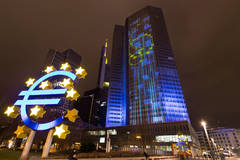
After a confusing few weeks, Monday`s Eurogroup meeting announced that Spain`s Economy Minister Luis de Guindos is set to be the new vice-president of the European Central Bank’s Executive Board (ECB EB). Following a face-off with Irish central banker Phillip Lane and intense lobbying by Spanish PM Rajoy, Mr Lane`s pull-out of the race on Monday sealed the deal. Following the appointment, stark criticism concerning Mr de Guindos’ lack of experience on monetary policy issues and his role as a politician, here seen as endangering the ECB`s treasured independence, has been expressed.
Sven Giegold, MEP and Spokesman for Economic and Financial Affairs for the Greens/EFA Group in the EP, stated: “When the Eurogroup appoints its own member, it demonstrates its own conflict of interest. Philip Lane clearly was the better candidate, therefore it is embarrassing that he was turned down”. The EP`s reported preference for Mr Lane follows a closed hearing last week. Facing off on matters of monetary policy, Lane is said to have been the more impressive candidate of the two.
In answering the criticism, de Guindos highlighted the need for a diversified set of profiles on the ECB EB. With Mr de Guindos widely credited with steering Spain through its worst recession and with the country currently in its fifth year of economic growth, his supporters see little validity to personal criticism pointing to a lack of experience. With respect to the independence of the ECB, de Guindos stated that having been part of a government or maintaining a certain affiliation did “not imply any impairment of the defence of the independence of the monetary authorities”.
The appointment signals the start of a shake-up within the ECB EB for the next 18 months, with four out of six positions up for grabs, including the position of Chief Economist rumored to be eyed by precisely Mr Lane. Despite assurance from Mr de Guindos that his appointment comes with no condition or promises of future appointments, the new vice-president can expect his next steps to be watched very closely.
While some observers see the appointment as a rebalancing act following six years without Spanish appointments to the ECB EB, other see it as a “new spring” of Spanish increased influence in European affairs. With Spain recovered from its devastating economic crisis, the fourth largest economy of Europe seems to be making a power grab to ensure its future influence, aiming to fill the power void following BREXIT.
